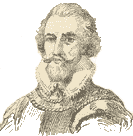Martin Frobisher, the noted English navigator, was born in Yorkshire and went to sea following his father’s death. In 1565, he became a captain and soon centered his activities on the pursuit of French shipping. He was arrested several times on charges of piracy, but managed to escape prosecution.
 In 1576, in the employ of Humphrey Gilbert, he made his first trip to the New World. After setting sail with three ships, one was lost in a storm and another deserted. The remaining vessel with Frobisher aboard pushed ahead into the maze of islands and inlets in northeastern North America. He discovered a bay on Baffin Island, which now bears his name, and believed that he had found the coveted Northwest Passage. Frobisher was further elated by his conviction that soil samples he took back to England contained gold.
The possibility that mineral wealth had been discovered by Frobisher attracted Queen Elizabeth's interest and support. She backed voyages in 1577 and 1578, but neither resulted in gold or colonization. Frobisher fell into official disfavor, but rebounded in 1585 when he accompanied Francis Drake on a raid against Spanish positions in the West Indies. In 1588, he served ably in the defense against the Spanish Armada and was knighted for his contribution.
After a short retirement, Frobisher returned to sea in 1594. He led a small fleet in search of gold-laden Spanish vessels in the Atlantic. Frobisher was mortally wounded in action during this campaign.
In 1576, in the employ of Humphrey Gilbert, he made his first trip to the New World. After setting sail with three ships, one was lost in a storm and another deserted. The remaining vessel with Frobisher aboard pushed ahead into the maze of islands and inlets in northeastern North America. He discovered a bay on Baffin Island, which now bears his name, and believed that he had found the coveted Northwest Passage. Frobisher was further elated by his conviction that soil samples he took back to England contained gold.
The possibility that mineral wealth had been discovered by Frobisher attracted Queen Elizabeth's interest and support. She backed voyages in 1577 and 1578, but neither resulted in gold or colonization. Frobisher fell into official disfavor, but rebounded in 1585 when he accompanied Francis Drake on a raid against Spanish positions in the West Indies. In 1588, he served ably in the defense against the Spanish Armada and was knighted for his contribution.
After a short retirement, Frobisher returned to sea in 1594. He led a small fleet in search of gold-laden Spanish vessels in the Atlantic. Frobisher was mortally wounded in action during this campaign.